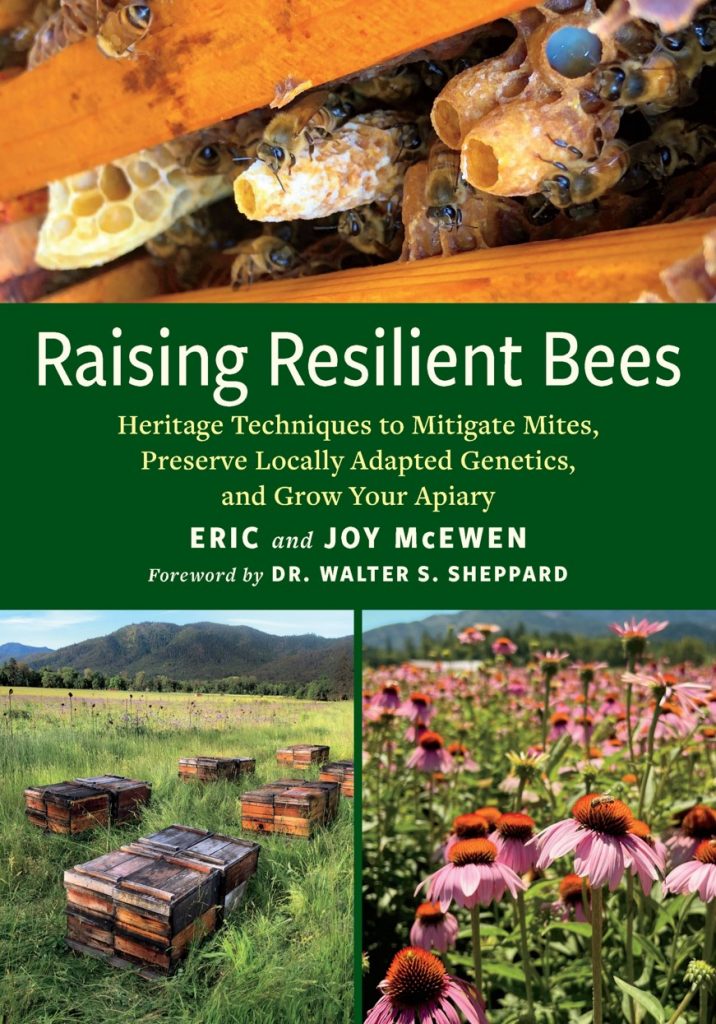Do you have enough bee books? Is there room for one more on your shelf? If yes, consider Raising Resilient Bees by Eric and Joy McEwen. (Chelsea Green Publishing. 2023. 254 pages).
Eric and Joy McEwen live on a 35 acre farm in the remote Illinois River valley of SW Oregon close to the California border. Their isolation figures prominently in their new book “Raising Resilient Bees – Heritage techniques to mitigate mites, preserve locally adapted genetics and grow your own apiary.” They wrote to describe their two beekeeping goals, to develop a more resilient honey bee population and to practice a functional organic farm and apiary management.
The McEwen’s, on their Diggin’ Livin’ Farm and Apiaries, have 2 decades of organic hive (and farm) management. As suburban transplants from the Midwest, they profess to “learning the hard way.” They make it clear their journey key has been to benefit and learn from mistakes. They call their 24 year beekeeping journey a “process of failure and adaptation”. Their Raising Resilient Bees book is a practical manual filled with trials and tribulations as they struggled to improve beekeeping success.
They use the term resilient throughout the book. What does it mean? In the books conclusion, the McEwen’s define resilience as “more than perseverance…it is perseverance in accord with natural truths, resulting in a strength supported by that natural foundation and [supported by] pillars of effort, courage and intentions.” They state success was finding new solutions to old problems.
What is Resilient beekeeping. Summarizing on Page 31 they state: “Every agricultural endeavor requires failure and experimentation …. learn from this recounting of our successes and failures to expedite your journey toward new levels of stability and productivity. Management tools and practices we advocate are in line with organic and biodynamic tenants….[that] will contribute to the health of land, the revitalization or improvement of which is ultimately required for truly resilient and productive apiaries……Even in the midst of pressure from varroa mites and environmental upheaval, a land-based matrix of regenerative farms intermeshed with functioning natural systems will maintain the requisite resilience to support natural life forms.”
Eric and Joy McEwen were trained in organic farming and permaculture at OSU. They lived in Benton Co. and one day were presented a bee hive by Dr Debbie Delaney, then an Oregon State University graduate student (Dr Delaney is my replacement at University of Delaware).. They took Mike Burgett’s OSU beekeeping course and bought their initial beekeeping equipment from GloryBee. When they moved to their present farm, they jumped right in with nucs from commercial beekeepers Kenny and Heike Williams. The first season yielded some honey to harvest but also produced a heavy loss the first winter due to varroa mites. That winter was followed by others of continued losses as they tried various means of sustainably controlling varroa.
This book will be a good addition for your beekeeping library, especially useful if you ever consider ‘upping your game’, whether to small scale commercial or for improvement of your stock/beekeeping return.. It will also be instructive if you are seeking to make your property bee compatible. As small scale commercials they have sought to integrate their bees into their farm management. One serves the other. Bees provide essential service to their environment and the environmental improvement feeds the bees.. They have made value-added farm goods as wholesalers, retailers and farmers’ market vendors. Their discussion of how they have approached development of several hive products is a joy to follow. It includes delightful expressions of great respect for the bees and their bounty.
Raising resilient Bees is not solely about keeping bees, although that is the major focus. It is also how we can compatibly work with and benefit both our and our bees environment. I recommend it as a useful addition to your bee bookshelf.

